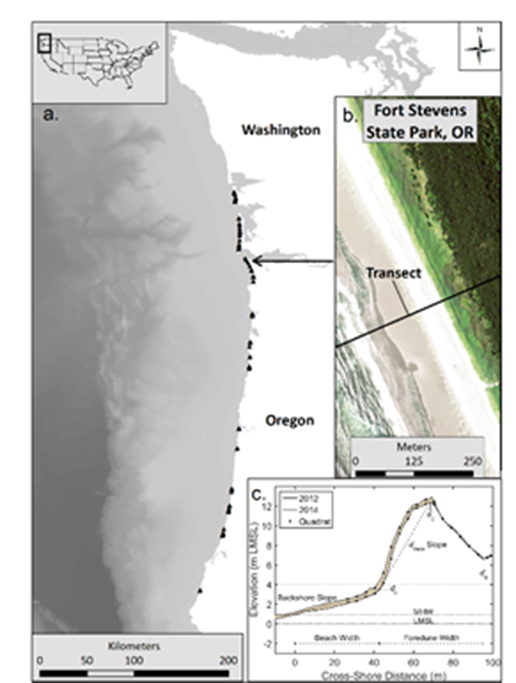The project team will use long-term monitoring data along the Oregon and Washington coast to evaluate the impact of sea level rise and storms on the geomorphology and ecology of beaches and dunes, with an emphasis on the ecosystem services and economic benefits they provide, including flood protection.

Field sampling will occur in the summer of 2020 at 15 coastal field sites in Oregon and Washington. Credit: NOAA.
Why We Care
Chronic stressors and extreme events associated with climate change, such as sea level rise and intense storms, can have severe impacts on coastal ecosystems and human populations. Natural barriers such as sand dunes reduce flooding along coastlines. These natural barriers are being affected by climate change and geological processes.
What We Are Doing
The project team will determine the economic value of ecosystem services provided by beaches and dunes and integrate the data and models to develop optimal policy scenarios for stakeholders. The ecosystem services include coastal protection, recreation, biodiversity conservation, carbon sequestration, and aesthetics under several adaptation pathways. The management and policy scenarios will be developed with an advisory council and coastal communities to identify realistic climate resilient adaptation pathways that aim to optimize ecosystem service production and economic returns.
Benefits of Our Work
The project will incorporate, for the first time, economic data from a variety of market and non-market ecosystem service valuation methods and then integrate these data into an agent-based model, allowing coastal communities to co-produce scenario-driven, policy-centric vulnerability and resilience assessments. Sea level rise, extreme storms, and beach and dune policy and management options will now be considered in a single assessment.
This project is led by Oregon State University, and is funded through the NCCOS Ecological Effects of Sea Level Rise Program. Project partners include the Oregon Department of Land Conservation and Development, Oregon State Parks and Recreation, Oregon County planners, the Surfrider Foundation, the U.S. Army Corps of Engineers, and Oregon Sea Grant.
 Official websites use .gov
A .gov website belongs to an official government organization in the United States.
Official websites use .gov
A .gov website belongs to an official government organization in the United States. Secure .gov websites use HTTPS
A lock or https:// means you’ve safely connected to the .gov website. Share sensitive information only on official, secure websites.
Secure .gov websites use HTTPS
A lock or https:// means you’ve safely connected to the .gov website. Share sensitive information only on official, secure websites.